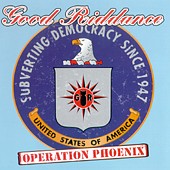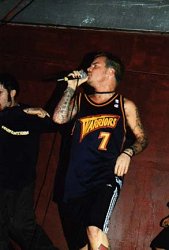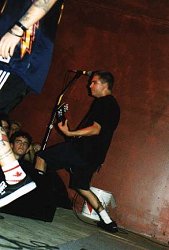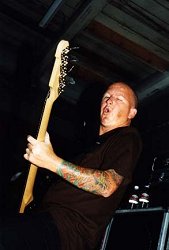INTERVIEW: Good Riddance
Pop-Punk Band
By: Crystofer Paules

In 1986 Russ Rankin decided he was going to start a band. He decided to call this band Good Riddance. Through four albums, several comps, and a few 7", and a couple of band members, Good Riddance have managed to rise above the monotony of modern punk rock. On their latest album, 'Operation Phoenix', Good Riddance successfully demonstrate how they have matured and developed as a band. The songs range from crowd pleasing anthems('Shadows of Defeat') to provocative political commentary('Winning the Hearts & Minds'). The musicianship on this album is as spectacular as it ever has been with Luke Pabich's rich guitar cascading over Sean Seller's and Chuck Platt's more than ample rhythm section.
On their latest album, 'Operation Phoenix', Good Riddance successfully demonstrate how they have matured and developed as a band. The songs range from crowd pleasing anthems('Shadows of Defeat') to provocative political commentary('Winning the Hearts & Minds'). The musicianship on this album is as spectacular as it ever has been with Luke Pabich's rich guitar cascading over Sean Seller's and Chuck Platt's more than ample rhythm section.
In Music We Trust had the opportunity to sit down and talk with lead yeller Russ Rankin about touring, life in general, and some good ol' fashioned metal.
Crystofer Paules: So what makes you guys different from any of the other punk/hardcore bands out there?
Russ Rankin: There is a lot more that makes us similar than makes us different. I think our style is pretty rare, I think we combine a lot of the ingredients of newer music, or punk music that has come out in the last 5 or 6 years, with a lot of elements of older bands like from a LONG time ago. Bands that, since we're older guys, like bands that we grew up listening to. Like you know, Dead Kennedy's, old Flag, Circle Jerks, Cro-Mags, bands like that. We really love like the older, more raw punk bands that were more political, more rougher production, you know back then a band couldn't spend the kindof money we could spend today to record. So, our band all seems to mix elements of the older stuff that we really like and inspired us. With like newer bands that are more melodic, that we really dig too. Bands like Bad Religion, well they've been around a long time, but you know, bands like Lagwagon, NOFX, and Pennywise. Awesome bands that play a more melodic style that we dig. So we try to take elements of stuff that we like without trying to sound like anybody else, which is really hard to do cause there are so many bands out there. I don't know if we're all that different, but that's kind of it. We combine like a newer sound with an older sound, kind of.
 Crystofer Paules: Why are politics and revolution, and that sort of thing such a motivating factor in your music?
Crystofer Paules: Why are politics and revolution, and that sort of thing such a motivating factor in your music?
Russ Rankin: I think for me, it's because I write most of the lyrics, it's because when I first got into punk that was what motivated me. I was a teenager during the Reagan administration, and that was a pretty sketchy time to live in. Like politically it was unsure of how things were blatantly wrong with how this country was being governed, and, the cold war was still pretty much going on. You know, you live under the shadow of nuclear war every day. So it made you feel really like... I felt really nihilistic and unsure and maybe cynical I think.
Crystofer Paules: Do you still feel that way?
Russ Rankin: Not so much, I mean part of it's always going to be with me. But politically, there's still craziness and there's still stupidity everywhere, but there's not so much like an us against them mentality. It's more just a bunch of different smaller countries all over the world trying to figure out a way to globally live together, you know. And I think that like the bands that I first got into were really political bands, like Crass and The Dead Kennedy's and Conflict, bands like that. So that's really initially what moved me about punk was the political aspect of it. The music was used as a medium to carry a message, which I really liked. The only alternative then, on the radio, was just ear candy, just like didn't mean anything. Which is fine for a lot of people, but for me I was disenchanted with what I was hearing on the radio, and what other people were trying to spoonfeed me as my favorite music. I thought it was cool, you know, being punk then was pretty character building. You had to like do some digging, kind of swim upstream to like the bands that you liked, to see the shows you wanted to see, and to live the lifestyle. I was going to high school and there was maybe three other kids that listened to punk. We were like outcasts and rebels, it was something romantic about that. It was scaring your parents, scaring older people and stuff. It's totally different because there are so many kids that are into that kind of stuff. But I think in other words that that's good. But that's always gonna be what brought me in, the politics, the possibility of affecting other people with your point of view and your opinions. Punk and Hardcore to me has always been about, like, just kids coming together and exchanging ideas, and realizing that together we're stronger than we are apart, and that we're all really not that different.
Crystofer Paules: What and who makes being in Good Riddance worth it?
Russ Rankin: I don't know. Getting to travel and getting to meet people all over the world. And to see the hardcore community on the global scale is pretty awesome. Realizing that we can travel someplace where they don't speak the same language as you, and might not even look the same as you, but they have the same fears and the same beliefs, the same values, and that hardcore can transcend those kind of barriers. It's really awesome to be a part of that.
Crystofer Paules: What's your favorite non-U.S. country to play in?
Russ Rankin: Australia or Canada, probably. Canada's amazing.
Crystofer Paules: Oh ya, Canada eh?
Russ Rankin: Uhh, yeah.
 Crystofer Paules: So why do you and your band endorse a 'cruelty free' lifestyle. Like inside of your albums it says 'Good Riddance endorses a cruelty free lifestyle, check out these books'. What motivated that?
Crystofer Paules: So why do you and your band endorse a 'cruelty free' lifestyle. Like inside of your albums it says 'Good Riddance endorses a cruelty free lifestyle, check out these books'. What motivated that?
Russ Rankin: Basically it's because we feel pretty strongly about it, and where we don't ever want to be a band that ever tries to preach to anybody, to shove any views down anybody's throats, because we don't know any more than anybody else. I think we all have the feeling that, like well most people we used to eat meat, we used to be part of this thing, and through education and through being exposed to ideas offered to us by other people we've made different choices in our lifestyles, and really feel strongly about the benefits of it. The only way it was ever presented to me was by somebody else saying 'Hey, check this out.'. So I'm hoping that by having the literature available at our merch table like we always do, and PETA, and having their name in our records, that people might check it out and give it a chance. Like a lot of times people, like I would talk to kids who would never check that stuff out on there own, but because a band that they like is into it they'll check it out. I was that way too, I still am. If anybody's got a good idea I'll listen to it. You know, and if it makes sense, if I research it and it makes sense I'll probably make some different choices. And I think that a lot of people who aren't vegetarian or haven't been exposed to it might get into it if they knew something about it. And most people I think are, in their hearts, caring compassionate people who if they realized they didn't have to be part of this, be involved in this loop of like destruction and torture and killing, most people would make some different choices. So that's the reason why we do it.
Crystofer Paules: Are their any favourite 80's hair metal bands of yours?
Russ Rankin: Oh yeah! Well, we love Kiss, but Kiss is more 70's, they were together in the 80's. Luke, our guitar player is an old retired metal head, he was in a thrash band and had long hair. He liked like Testament, Slayer, Violence, Kreator, all those bands, Anthrax, Metallica, Judas Priest.
Crystofer Paules: Do you guys like any new metal?
Russ Rankin: New metal? Well, we all really like Man-O-War but their really not that new. I like some like, some black metal. It's pretty crazy.
Crystofer Paules: Like Emperor?
Russ Rankin: Emperor yeah.
Crystofer Paules: Mayhem?
Russ Rankin: I haven't really heard Mayhem, I heard one song. I've got this really cool comp with all of this black metal. But I can only take like 3 or 4 songs on it at a time. But it's pretty crazy. We got to see some of those bands play in Europe and it was nuts.
Crystofer Paules: Is it good live?
Russ Rankin: Yeah, but it's like weird, black, there's no lights, and they all wear like makeup and stuff and people and kids like paint their faces and hold up upside down crosses. It's kind of scary, seeing it live I was like 'Whoa'. I think it's just funny.
Crystofer Paules: When did you first come to the realization that you could affect other people through your music?
Russ Rankin: I don't know. It's happened a lot. Probably getting letters from people. We get a lot of letters. Like even my favorite bands, I never thought I would've taken the time to write to. So to think that people actually take the time to write to us. Because it means so much, we read all our mail. I mean, I read everything that we get. We get some amazing letters of people who, like our music has helped them through a tough time in their life, or made them look at something in a different way. Probably the most raddest thing was when a girl told me that the song waste on our third record, because of that song, she stopped eating meat, just because of that song. I never thought that would ever happen. It was pretty amazing to think about. Our music had touched somebody that way and affected them in a way that was a positive way to make an actual lifestyle choice. We don't wanna be a band that like tries to foster the impression that we want to change people's lives. If somebody takes something positive from our music rather than negative, then that's something that we all strive for. We don't expect to change people's lives, but if one kid comes to one of our shows and leaves feeling a little bit better about themselves, feeling empowered or enlightened at all. Or even if having turned a shitty day into a good day, that's like the raddest thing. If we can do that, then we have succeeded.
 Crystofer Paules: So what do you think is gonna happen with this whole Y2K thing?
Crystofer Paules: So what do you think is gonna happen with this whole Y2K thing?
Russ Rankin: It'll be New Year's like usual, with a few more crazy people out.
Crystofer Paules: Where do you see Good Riddance at in like 10 years?
Russ Rankin: I don't. I don't even want to think that far ahead. Personally I think I'll always stay involved with music. I can't imagine not listening to punk or hardcore. I'd like to always stay in music, even if it's on a smaller scale when I get to old to tour or whatever. Might start a record label. I see so many bands that if they had the right push or the right help, they could like get more out of it than their getting. It's really tough being in a band, it's really hard you know? I've seen so many great bands that don't ever go anywhere because no one's really there to like help them, and we've been really fortunate. So if there's any way I could give something back, like starting up a label. I think it'd be cool if I could like stay involved in the scene and use my experience to help other bands.
Crystofer Paules: Any final words?
Russ Rankin: No, not really. Just to thank everybody that has supported our band. You know, people that write us, talk to us, buy our albums, come to our shows. We're out here all the time because people keep supporting us and like what we're doing. It's awesome. So thanks.

